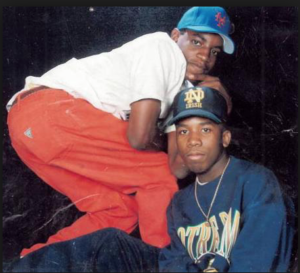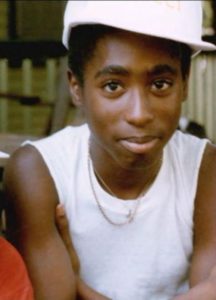By Kris Cervantes
Human beings are storytellers – we look for meaning through narrative, craft pattern and purpose from the sometimes random-seeming events of our lives. Ideally, stories create meaning and – even more ideally – they have a happy ending.
The story of Jesse Washington doesn’t have a happy ending. Jesse died on the threshold of adulthood, violently and in agony, as those in power literally stood by and observed; as 15,000 white residents of Waco and McLennan County not only watched but cheered, struggling through the crowd to get closer, to abuse and mutilate Jesse, to inhale the scent of his burnt flesh as he was roasted alive over an impromptu bonfire, to throw broken-up furniture onto that fire, to kindle the flames higher.
There’s no rescue at the end of Jesse’s story. No one prevents Jesse’s pain, or even puts him out of his misery. There’s no mercy killing; he lives for hours and is slowly burnt and hacked to pieces, until at last death brings peace to his soul – if not to his body. No one who attended seemed to feel bad for their participation in this atrocity; families watched the lynching with their children. Some of those children paid 25 cents for a link of the chain upon which Jesse’s body had been hoisted; later – when Jesse’s body had been abused to the point of disintegration – they sold Jesse’s teeth for $5 each.
Jesse’s death didn’t happen in the dark of night. It wasn’t hidden away in the woods. It happened just outside the courthouse, on a Monday, at lunchtime.
The story of Jesse Washington, which began in 1899 when he was welcomed as an infant into a loving home, in or near Robinson, Texas, doesn’t have a happy ending.
For a few decades, the story of Jesse Washington’s death was told as a warning about Waco; W.E.B. Dubois published an 8-page expose featuring graphic photographs of Jesse’s murder, and later penned the short story “Jesus Christ in Texas,” inspired by Jesse’s story. The NAACP was galvanized by the Waco Horror, as the story of Jesse’s lynching came to be called. And in Waco, Jesse’s family, like other African American families affected by lynching – which is to say, like all African American families – passed the story of Jesse’s death down the generations, a cautionary tale. Step out of line? Those in power in McLennan County – and all over the south – have proven what happens to black folks who do that. We have the stories to prove it.
Lynching is the act of putting someone to death, especially by hanging, by mob violence and without legal authority. Another word for “lynching” is “murder.” Lynching is mob justice; lynching is murder; lynching is social control.
One hundred years have passed since the sunny day when Jesse Washington, a 17-year-old field laborer, was accused of murder, tried, convicted, and dragged from the courtroom by some of the 2,500 white Wacoans who had crowded in to see the trial. That story is written; justice was not done.
We can’t rewrite history – although we sometimes try. We can’t deny what happened a century ago, in the time of our grandparents and great-grandparents. We can pretend to forget. We can say, “That story doesn’t belong to me. It doesn’t belong to my people, my tribe” – but we do so at our peril.
The story of Jesse Washington – painful, shameful, terrible, true – is our story. Waco’s story, Robinson’s story, McLennan County’s story. It’s a story told not only here but all over Texas, all over the south, all over the U.S.
And.
(There’s always an “and.”)
And that story is written.
And – it is not the only story, or the last story, that will be written about Waco, about us.
We – today, now – cannot rewrite the story of Jesse Washington, but we can decide how Jesse Washington’s story shapes narratives as yet unwritten. We can decide to mourn for Jesse, to hold his family in our hearts, to surround all the families stained by our lynching past with love and care, to rededicate ourselves to the creation of a community which promises and delivers justice and compassion to all: the greatest and the least, the most powerful and the most vulnerable.
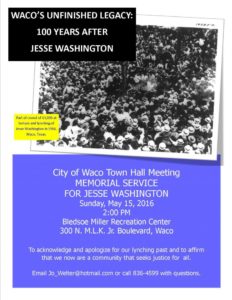 We are invited to remember Jesse’s story, and to consider our own stories for the future, with a memorial service in Jesse Washington’s memory. Please join us this Sunday at 2 p.m. at Bledsoe Miller Recreation Center (300 N. MLK Jr. Blvd.) as we begin to create a new meaning, a new journey, a new story for our community: together.
We are invited to remember Jesse’s story, and to consider our own stories for the future, with a memorial service in Jesse Washington’s memory. Please join us this Sunday at 2 p.m. at Bledsoe Miller Recreation Center (300 N. MLK Jr. Blvd.) as we begin to create a new meaning, a new journey, a new story for our community: together.
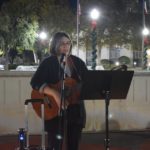 Kristen Cervantes is the pastor at the Unitarian Universalist Fellowship of Waco, and a Waco native. She is on the board of the Greater Waco Interfaith Conference, and has been an active part of planning Waco’s commemoration of the life and death of Jesse Washington. She is also a member of the Community Race Relations Coalition and KWBU’s Community Advisory Council. In her spare time she reads, writes, makes music, and watches superhero movies – sometimes at the same time.
Kristen Cervantes is the pastor at the Unitarian Universalist Fellowship of Waco, and a Waco native. She is on the board of the Greater Waco Interfaith Conference, and has been an active part of planning Waco’s commemoration of the life and death of Jesse Washington. She is also a member of the Community Race Relations Coalition and KWBU’s Community Advisory Council. In her spare time she reads, writes, makes music, and watches superhero movies – sometimes at the same time.
The Act Locally Waco blog publishes posts with a connection to these aspirations for Waco. If you are interested in writing for the Act Locally Waco Blog, please email [email protected] for more information.
By Jenuine Poetess
This month I had a conversation with Keira Collins, behavior specialist for the Klaras Center for Families YES program and founder of ART (A Reason To…). She has organized the growth of the YES program to include visual and written arts programming, is a volunteer with Waco Poets Society, and I am excited to share a glimpse of her work and vision with you.
Jenuine Poetess: Please share a bit about yourself generally—as an artist, as a community organizer/youth worker, as a person with various roles/identities.
Kiera Collins: I work as a behavior specialist for Heart of Texas MHMR region Klaras Center for Families, more specifically, as a part of the YES program. My job entails mentoring and tutoring, but I also organize activities, create programs, perform community outreach and coordinate services for the clients that we serve. I am able to be creative in my job role and being a creative, visual person has helped me create a name for myself.
JP: How did you first connect with art?
KC: I wrote my first poem when I was in the 3rd grade, without knowing what a poem was. I have been writing ever since. Before that my dad exposed me to different musical genres, reggae, rock, and jazz. I remember what it was like growing up listening to Led Zeppelin and The Beatles and falling in love with the lyrics and how well the music complemented the words being sung.
JP: What about art as an expression drew you in?
KC: Growing up I felt unheard and lost my voice, but writing was a way for me to regain my power. I could say what I was feeling and express it in a way that I was heard.
JP: How did you come to integrate creative process with your work with youth?
KC: Working with the kids in the YES program has been exciting and trying at times. I have been able to use my creativity and the connections that I have made in the art community to create an art program that meets bi-weekly for an hour, to help create a writing group that meets weekly for an hour and a half, I ran a successful online campaign that provided us with books for a library; and have made numerous connections across Waco in an effort to provide our kids with positive outlets and give them a chance to discover their passions.
JP: What do you see as the value of incorporating art into youth development?
KC: The value lies in self-expression and self-acceptance.
JP: What are your favorite mediums to play with?
KC: Poetry, painting, and drawing.
JP: Would you share about a project you are working on or plan to work on in the future?
KC: Friday, May 6th was the 1st children’s mental health awareness event at Klaras Center for Families. I organized the event along with my supervisor. That was exciting and I look forward to next year. I am always working on something new and exciting, but now I am starting to plan our summer activities.
JP: What are some of your needs/how can Wacoans get involved?
KC: MALE mentors! One area that we are in need of is positive male role models for our youth. I know a lot of emphasis is put on boys not having positive male figures in their lives, but that is just as important for our young females. Anyone willing to volunteer their services is welcome to contact me and discuss how they would like to help. Business owners looking to make a difference is also welcome. We work with Jessica G., the owner of Hair and Beauty Art Studio, our kids volunteer at her hair salon and learn basic communication and customer service skills. They are also able to express themselves creatively by decorating the store front window and painting/ drawing signage for the shop. She and the ladies that work there have been instrumental in helping the families we work with by providing a different type of “learning” environment along with haircuts and providing services for our parents that promote self-care.
JP: What do you love about Waco?
KC: I like how small Waco is and how there’s a sense of community.
JP: What would you like to see more of in/around Waco?
KC: I would like to see more community collaborations and involvement, more festivals, and more youth-centered opportunities.
JP: Anything else on your heart to share?
KC: I am grateful to have the opportunity to work for KCF as a part of the YES program and I look forward to seeing how the program will grow.
 Kiera Collins, born and raised in New Orleans, is a writer/poet and currently resides in Waco, Texas. Being from New Orleans is a different experience and is something she draws on for inspiration. She has an 8-year old white Schnauzer, Jack-Jack, and three nephews. She is a children’s mental health professional and she enjoys what she does. To connect with Kiera, email: [email protected] .
Kiera Collins, born and raised in New Orleans, is a writer/poet and currently resides in Waco, Texas. Being from New Orleans is a different experience and is something she draws on for inspiration. She has an 8-year old white Schnauzer, Jack-Jack, and three nephews. She is a children’s mental health professional and she enjoys what she does. To connect with Kiera, email: [email protected] .
 Jenuine Poetess is an artist, visionary, and community organizer. In 2010, she founded In the Words of Womyn (ITWOW), an international, grass-roots, written and spoken-word arts project with chapters throughout Los Angeles, CA; Waco, TX; and Lebanon. Jenuine is the founder of Waco Poets Society and co-founder of the Central Texas Artist Collective. She writes, organizes, and creates rooted in the fierce conviction that holding intentional space, access, and opportunity for all people to foster their creative health is a matter of justice and is a vital asset to the sustainable thriving of communities. She currently lives and poems in Central Texas where she enjoys finding new ways to disrupt the homeostasis of her city. You can contact her at: j[email protected].
Jenuine Poetess is an artist, visionary, and community organizer. In 2010, she founded In the Words of Womyn (ITWOW), an international, grass-roots, written and spoken-word arts project with chapters throughout Los Angeles, CA; Waco, TX; and Lebanon. Jenuine is the founder of Waco Poets Society and co-founder of the Central Texas Artist Collective. She writes, organizes, and creates rooted in the fierce conviction that holding intentional space, access, and opportunity for all people to foster their creative health is a matter of justice and is a vital asset to the sustainable thriving of communities. She currently lives and poems in Central Texas where she enjoys finding new ways to disrupt the homeostasis of her city. You can contact her at: j[email protected].
The Act Locally Waco blog publishes posts with a connection to these aspirations for Waco. If you are interested in writing for the Act Locally Waco Blog, please email [email protected] for more information.
by Jorge Burmicky
I moved to Waco in 2012. Like many of the stories you’ve heard before, I moved here because Baylor offered me a job. My first time in Texas was the day of my on campus interview. The first restaurant I went to was “Bangkok Royal” for my initial interview – which also happened to be the first place where I met my now wife, Monica, but that’s a separate story. I knew Waco would become home the moment I discovered that HEB sold Harina PAN, a special type of maize flour used to make the traditional Venezuelan arepa in the “international foods” section. I took a picture of it and texted my parents saying: “I think I’ll be alright here!” (If you’re interested in trying arepa, I recommend going to the Colombian food truck at University Parks or at the farmer’s market, “Mi Cali Bella.”)
At first, moving to Waco was a bit of a confusing experience, to say the least. Not being from Texas, I experienced culture shock immediately after my first trip to the grocery store, or in simpler terms, HEB. I picked up a couple of groceries and after going through the checkout line, I greeted the cashier with a friendly “how are you?” to which she responded, “I’m BLESSED!” I immediately told myself, “wow, what a positive outlook on life!” Little did I know that “blessed” can have multiple meanings or no meaning at all, depending on the context.
Now that I’ve lived here for a couple of years, people often ask me all kinds of questions about Waco. Once I get past the usual “Fixer Upper” questions, they tend to ask me about my work at Baylor and what I do for fun. It’s a tricky question because as a residence hall director, I don’t have much of a regular routine since working with college students can be rather unpredictable. However, I generally answer that question with something along the lines of “you know what, I don’t quite know, but I feel very at home in Waco.”
But what do I really mean with that, you may ask? I grew up in Venezuela to a Venezuelan mother and a Slovenian father. In the United States, I identify as Latino, and being Latino in America is a rather complex identity (I will talk more about this next Sunday, Part II). Being of Venezuelan origin makes me a rare breed in Waco, mainly because this is a heavy Mexican descent region. I never thought I’d learn so much about places like Zacatecas (the Mexican state, not the taquería, although, I do like their tacos!) and my Mexican colleagues often make fun of my Spanish accent because to them, I sound like a telenovela (hint: generally speaking, Venezuela is known for having oil, winning the most Miss Universe pageants, and their soap operas or telenovelas). While most of us identify as Latino or Hispanic, I have learned a great deal about what it means to be of Mexican descent in the context of Central Texas, which is fascinating!
Additionally, I am also very invested in the work I do and my students at Baylor. For the most part, my schedule is heavily influenced by Baylor’s calendar, and to be perfectly honest, I love my job. I have also learned a lot about our “town and gown” relationship and the way in which institutions such as Baylor, MCC, and TSTC interact with the city and vice versa.
With that being said, how does one embrace the Wacoan in you while claiming various, often times, opposing identities so strongly? In my opinion, you appreciate the small and big things your city has to offer. Sure Waco has Baylor, Magnolia, the Texas Sports Hall of Fame and the Mammoth site, just to name a few. But it also has a unique blend of people and a welcoming culture/environment that allows you to fit in and most importantly, belong– and yes, having HEB with a heavy section of Goya products does help!
In part 2 next Sunday, I will go more into detail about the meaning of these various social identities and the way in which they’ve impacted my work, my relationships, and the way I engage with the city.
 Jorge Burmicky currently works at Baylor University in the department of Campus Living & Learning. He’s passionate about college student development and contemporary issues in higher education, particularly access and retention of underrepresented students. He is married to Monica who works at McLennan Community College as the director of TRIO Student Support Services. They are expecting their first born (baby girl!) in June and couldn’t be more excited about it!
Jorge Burmicky currently works at Baylor University in the department of Campus Living & Learning. He’s passionate about college student development and contemporary issues in higher education, particularly access and retention of underrepresented students. He is married to Monica who works at McLennan Community College as the director of TRIO Student Support Services. They are expecting their first born (baby girl!) in June and couldn’t be more excited about it!
By Crystal Hernandez
Sometimes good things just keep getting better, and it may have for the YMCA’s Diabetes Prevention Program. You may remember that it wasn’t very long ago when I shared with you that those at risk for developing type 2 diabetes are not necessarily destined to a lifetime of checking blood sugar levels and managing medications. Perhaps you recall hearing about the YMCA’s Diabetes Prevention Program and being excited and encouraged to know the year long program that has been proven to reduce the risk of type 2 diabetes in those that have pre-diabetes by 58% and by 71% in those over the age of 60 is right here in Waco, available to you.
Well, you weren’t the only one excited. It appears that insurance companies were also intrigued by the possibilities of this program. That’s why the Centers for Medicare and Medicaid Innovation (CMMI) funded a 3-year study to see just what the results and cost savings would be if this program did indeed do what it said it would do.
They watched as 17 YMCA’s implemented this program and they awaited the results of the 8,000 folks that were served during the 3-year study. And do you know what they found out? Medicare estimated cost savings in a 15-month period to be $2650 per person when compared to similar beneficiaries not in the program. This is the first time a CMMI pilot has been proven to lower the incidence and reduce the cost of type 2 diabetes.
There are several gems that are a result of this study. One is that those in the Waco community have a program available to them that can help them receive the same results as the 8,000 people in this study. Another jewel here is that this has begun a discussion and started the process, although it may be lengthy, of making this program a covered benefit to those insured by Medicare. This could also mean that other insurance companies may follow Medicare and Medicaid’s lead. Perhaps it even means that in the future other prevention programs may be covered benefits. How nice it would be to know your desire for better health is supported by your insurance company.
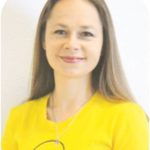 This Act Locally Waco blog post was written by Crystal Hernandez. Crystal is the Chronic Disease Specialist for the Waco Family YMCA. She received her degree in Exercise Science and Health Promotion from the University of Memphis. She and husband Shawn are blessed to be the parents of 4 beautiful children. In her free time, she loves hitting the pavement and pounding out a good run.
This Act Locally Waco blog post was written by Crystal Hernandez. Crystal is the Chronic Disease Specialist for the Waco Family YMCA. She received her degree in Exercise Science and Health Promotion from the University of Memphis. She and husband Shawn are blessed to be the parents of 4 beautiful children. In her free time, she loves hitting the pavement and pounding out a good run.
The Act Locally Waco blog publishes posts with a connection to these aspirations for Waco. If you are interested in writing for the Act Locally Waco Blog, please email [email protected] for more information.
By Christina Helmick
Have you heard the saying “there is an app for that?” I have an app that automatically texts people when I am in a certain area, another app that keeps track of the steps I’ve taken, and an app that organizes my grocery list based upon food categories. What about an app that provides daily activities for adults to do with children to help prepare them for Kindergarten? Well, there is an app for that too!
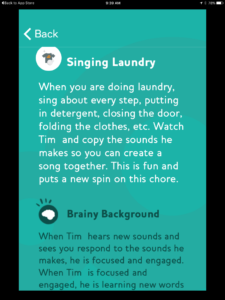 The Prosper Waco Kindergarten Readiness work group, along with other Prosper Waco community partners like the Cameron Park Zoo and the Mayborn Museum, are promoting a free parenting tool called Vroom. Vroom, which you can download on any smartphone, tablet or computer, provides you with daily, age-appropriate brain building activities to do with children ages 0 to 5. Each activity comes with science-based background information that allows adults to understand how that specific activity is building the brain development of the child. To download the app, go to the App Store and search for “Vroom” or “Daily Vroom.”
The Prosper Waco Kindergarten Readiness work group, along with other Prosper Waco community partners like the Cameron Park Zoo and the Mayborn Museum, are promoting a free parenting tool called Vroom. Vroom, which you can download on any smartphone, tablet or computer, provides you with daily, age-appropriate brain building activities to do with children ages 0 to 5. Each activity comes with science-based background information that allows adults to understand how that specific activity is building the brain development of the child. To download the app, go to the App Store and search for “Vroom” or “Daily Vroom.”
If there is someone you know that would enjoy practicing brain building with their infant, toddler or preschooler and doesn’t have access to the Internet, give us a call at 254-741-0081 to receive physical copies of the Vroom activities.
Depending upon if you are an early childhood care provider, a community organization or a community member who wants to raise awareness about Kindergarten Readiness, there are different ways you can promote Vroom.
 For example, if you are an early childhood care provider or an organization that directly deals with children ages 0 to 5 and their families, you can distribute information to your families about Vroom and hang posters around your facility! If you are a community organization like the City of Waco, you can hang posters around your workplace and include a Vroom flyer in your welcome packets to new hires. If you want to help promote Vroom on an individual level, bring Vroom flyers with you to meetings you attend and direct people to the Vroom tab on the Prosper Waco website so they can learn more about the app! To learn more ways to help promote Vroom within our community and the organizations working together to promote the app, visit our website.
For example, if you are an early childhood care provider or an organization that directly deals with children ages 0 to 5 and their families, you can distribute information to your families about Vroom and hang posters around your facility! If you are a community organization like the City of Waco, you can hang posters around your workplace and include a Vroom flyer in your welcome packets to new hires. If you want to help promote Vroom on an individual level, bring Vroom flyers with you to meetings you attend and direct people to the Vroom tab on the Prosper Waco website so they can learn more about the app! To learn more ways to help promote Vroom within our community and the organizations working together to promote the app, visit our website.
Everyone in our community can use #Vroom254 to encourage brain building activities!
This free parenting tool is one element to addressing the Prosper Waco Kindergarten Readiness goal of increasing the percentage of Kindergarten ready students by 50 percent by 2020.
Don’t hesitate to reach out to Christina Helmick [254-741-0081] with questions about Vroom or how you can help promote the free parenting tool!
 Christina Helmick is the director of communication at Prosper Waco. She is a recent graduate of Baylor University with a BA in Journalism, Public Relations & New Media. Originally she is from Washington, D.C., but has stayed in Waco post-graduation. She is an active mentor at J.H. Hines Elementary School, enjoys spending time with her family and watching Baylor football. Sic ’em Bears!
Christina Helmick is the director of communication at Prosper Waco. She is a recent graduate of Baylor University with a BA in Journalism, Public Relations & New Media. Originally she is from Washington, D.C., but has stayed in Waco post-graduation. She is an active mentor at J.H. Hines Elementary School, enjoys spending time with her family and watching Baylor football. Sic ’em Bears!
The Act Locally Waco blog publishes posts with a connection to these aspirations for Waco. If you are interested in writing for the Act Locally Waco Blog, please email [email protected] for more information.
For more about Vroom see this recent Prosper Waco talk show that focuses on the app and brain building…
By Krissica L. Harper
As an advocate, college admissions recruiter, and educator in the areas of youth and student development, I have noticed that a large percentage of inner-city high school students are not aware of the things needed to start their collegiate, educational, and career pursuits. Like them, I was a kid in the inner-city. Low-income and “at-risk” were a few words that the school system used to label me. Having a single parent household and incarcerated parent is/was tough. I am forever grateful to my mother and “the village” around me that introduced my sibling and me to a variety of different summer programs and more. Some of those included athletic camps, educational tours, and views from the 6. (kidding on that last one, ha ha) But, the KEY to those experiences was just that- I EXPERIENCED them. I heard once that there wasn’t so much an “educational gap” as there was an “access and skills (experience)” gap. Those experiences changed the trajectory of my life.
Finances play a huge role in accessing educational/informational opportunities for inner-city youth. Growing up, my mother worked multiple jobs so that we could afford to participate in extracurricular activities. There were also some activities that we could not do because of the costs associated with them. I know how it feels to want to do something that other kids did, but with money being the deciding factor, not be able to do it. I also recall going back to school in the fall and the teacher asking for everyone to stand and tell the class what they did over the summer. It is not exciting when you’re the kid that does not have much to tell everyone. On many occasions, reluctantly, I made up worthy-enough stories that would match up with my classroom peers. Not a good feeling.
Below I have listed a few tips on how inner-city youth can search and access some EXPERIENCES that can help them achieve results in and out of the classroom. I want to help take our youth and their interests, gifts, and talents to new heights this summer! I also want them to be the kids with exciting stories to tell the class or write about next school year!
Enjoy..
1. HIT THAT HASHTAG
NOW to my young, hip, Snap Chattin’ young’uns — there will be some free programs around your city. If you are on social media, go ahead and hit that hashtag. What are you interested in? Maybe there are some events that coincide with that exact thing. See if there are a few hashtags that you can hit on Twitter and Instagram. Sites like Eventbrite, Meetup and Act Locally Waco list local and statewide events and happenings that you can attend this summer. Get up, get out, and Remember: EXPERIENCES CAN SHAPE YOUR REALITY.
Like my guys from Outkast once said,
“you need to git up, git out and git somethin
Don’t let the days of your life pass by
You need to git up, git out and git somethin
Don’t spend all your time tryin to get high
You need git up, git out and git somethin
How will you make it if you never even try
You need to git up, git out and git somethin
Cuz you and I got to do for you and I”
2. R-E-A-D
Yes, R-E-A-D in the summer. READ! The summer is an amazing time to reflect on things that happened during the school year. Often times we want to get away from anything pertaining to school during the summer. However, why not enjoy the sun, enjoy the swimming pools, and GET AHEAD? Take the time to expand your knowledge. Being in the inner-city there are some negative distractions that could impact your life in a major way. What if you decided that you won’t let those distractions hinder you from growing? Les Brown, Eric Thomas, and Gary Vaynerchuck are a few folks that I want you to get acquainted with this summer.
I never forget the words of 2PAC that speak to inner-city youth like you and myself-
“You try to plant somethin in the conrete, y’knowhatImean?
If it GROW, and the and the rose petal got all kind of
scratches and marks, you not gon’ say, “[DANG], look at
all the scratches and marks on the rose that grew from concrete”
You gon’ be like, “[DANG]! A rose grew from the concrete?!”
Same thing with me, y’knahmean? I grew out of all of this
Instead of sayin, “[DANG], he did this, he did this,”
just be like, “[DANG]! He grew out of that? He came out of that?”
 3. Drake was right…
3. Drake was right…
…At the end of this summer, you want to be able to say, “Getting things done around here.” #SummerSixteen 😉
#GetPAPER – “Passionate About Purpose Expecting Results”
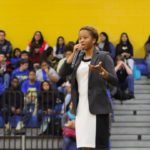 Krissica Harper is a youth and student development advocate, college recruiter, and educator. She conducts and curates workshops, events, and more. Here goal is to inspire others to live with purpose and pursue their passions. This post first appeared on her own blog which you can follow at medium.com/@krissicaharper. Connect with Krissica on social media @KrissicaHarper. Any questions? Contact her directly: [email protected].
Krissica Harper is a youth and student development advocate, college recruiter, and educator. She conducts and curates workshops, events, and more. Here goal is to inspire others to live with purpose and pursue their passions. This post first appeared on her own blog which you can follow at medium.com/@krissicaharper. Connect with Krissica on social media @KrissicaHarper. Any questions? Contact her directly: [email protected].
The Act Locally Waco blog publishes posts with a connection to these aspirations for Waco. If you are interested in writing for the Act Locally Waco Blog, please email [email protected] for more information.
by Allison Allen
Living in my north Waco neighborhood has its challenges especially if you’ve read the headlines of house fires and a recent homicide. As a neighbor it is heartbreaking to know that loss and destruction are literally outside my front door. I struggle to reconcile these realities with my personal experience of living here which is overwhelmingly positive, one of life and hope and connections with neighbors.
It reminds me (a little) of the Nobel Prize winning novel, All the Light We Cannot See by Anthony Doerr. The story is set in occupied France during World War II in the midst of loss and destruction. The novel centers on a blind, French girl and a German boy whose paths eventually, miraculously cross. Their meeting toward the end of the book is the “light” that cannot be seen in the fog of war. And their brief friendship leads to life, hope and connections.
A bright light going on right now in north Waco is the possibility of a REAL grocery store at the corner of 15th and Colcord, Jubilee Food Market. A store with actual live fruits and vegetables at actual grocery store prices! This may sound mundane and commonplace, but when the closest grocery store is over two miles away and you don’t have a car, it’s big news. And, it’s what the neighbors in north Waco are asking for, and all of Waco can help make it happen. (Click here for details: http://missionwaco.org/jubilee-market/.)
And, there are other everyday lights that I see all around my little corner of our city. Neighborhood kids of all colors playing together outside all summer long, people walking everywhere and stopping to say hello to neighbors, teenagers going door to door selling candy to raise money for their schools, my son getting his best haircut from our neighbor, neighbors mowing each others’ yards, tenants becoming homeowners on every street, and on and on the lights shine…
Sirens come then go
A fine balance to be sure
This life in Waco
 Allison Allen has lived in north Waco with her family for 14 years. She’s a mother to 2 above average children, a wife to a pretty good husband and a property manager of some very clean and affordable apartments in the downtown area.
Allison Allen has lived in north Waco with her family for 14 years. She’s a mother to 2 above average children, a wife to a pretty good husband and a property manager of some very clean and affordable apartments in the downtown area.
The Act Locally Waco blog publishes posts with a connection to these aspirations for Waco. If you are interested in writing for the Act Locally Waco Blog, please email [email protected] for more information.
By Scott Bland
For more than 30 years, our educational system has done a disservice to our kids by teaching them that the primary path to a successful future is completing a four-year degree program after high school graduation. There are many unintended consequences of this educational track. The primary consequence is that kids who have no desire to attend a college or university feel as though they are inferior or somehow not as valuable as their peers who move on to advanced degrees. These children are not taught or shown other paths that are just as valuable and lead to rewarding careers as those requiring college degrees.
The construction industry is made up of careers that pay salaries that are in line with or higher than many careers requiring a college degree. As the construction industry has become more and more technical, these jobs in the plumbing, electrical, and heating and air conditioning industries require the completion of advanced certification programs. Achieving these certifications requires just as much dedication, commitment, and maturity as completing a typical four-year degree program. In our Central Texas Area, the starting salaries for licensed plumbers, electricians, and heating and air conditioning technicians fall into a similar range as starting salaries for college graduates. After completing their certification program, students in these fields can expect to start out earning between $35,000 and $45,000 per year.
Because there is such a shortage of qualified workers in the construction industry, most companies are hiring students who are still in the certification process and putting them to work gaining valuable experience in apprentice positions. Students who come out of high school ready to begin a career can use this option as a means to help pay their way through their studies and not incur the crippling debt that so many four-year degree students are saddled with upon graduation. For children from low-income families, this is a viable path to breaking the cycle of poverty that has become generational for many of our students.
A secondary consequence of the “four-year degree or bust” model is the creation of a massive shortage of the skilled workers necessary to create housing, commercial projects, and public infrastructure – and those are just a few of the industries that are dealing with this terrible shortfall in labor. While it is a wonderful thing to have lots of English professors and accountants, we aren’t going to be able to rely on our tax guy to fix our plumbing when the pipes in our house start to leak.
And that brings me to an unintended consequence that is impossible to quantify. I firmly believe that there are a great number of people working in careers they hate. They wish they had spent their time and money in other pursuits, but they were taught from Kindergarten on that to be a successful person in our society you had to have that four-year degree. There was a stigma placed on careers that didn’t require that college degree. When you look at how many or our greatest entrepreneurs either never went to college or started and dropped out to pursue their passion, it is obvious that there are many paths to being a success. Our children need to be exposed to those paths, so they can make the best choices for them. That way maybe the next Steve Jobs doesn’t have to drop out of college and work out of a garage to achieve his or her dreams. And, yes, Jobs was a college dropout along with Mark Zuckerberg, Russell Simmons, Brad Pitt, Ted Turner, Bill Gates, and even Oprah to name just a few.
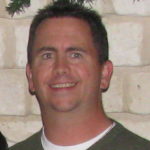 Scott Bland was born and raised in Waco. He is an alumnus of Baylor University. He worked for Highland Homes in the Dallas area from 1998 to 2001, then joined the United States Secret Service as a Special Agent after the 9/11 attacks. He retired his commission in late 2006 to return to Waco and take over the family business, Jim Bland Construction, where he has served as Owner and President of the company for the last 10 years. He is currently the President of the Heart of Texas Builder’s Association as well as a member of the Board of Directors for the Greater Waco Chamber of Commerce.
Scott Bland was born and raised in Waco. He is an alumnus of Baylor University. He worked for Highland Homes in the Dallas area from 1998 to 2001, then joined the United States Secret Service as a Special Agent after the 9/11 attacks. He retired his commission in late 2006 to return to Waco and take over the family business, Jim Bland Construction, where he has served as Owner and President of the company for the last 10 years. He is currently the President of the Heart of Texas Builder’s Association as well as a member of the Board of Directors for the Greater Waco Chamber of Commerce.
The Act Locally Waco blog publishes posts with a connection to these aspirations for Waco. If you are interested in writing for the Act Locally Waco Blog, please email [email protected] for more information.
by Dr. Emma Wood
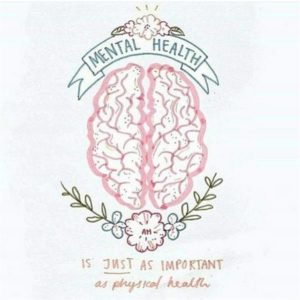 We live in a culture that values productivity over health, outward validation above personal contentment, the bottom line (usually money) over the complex and at times painful beauty of being human. Within this culture, physical health is acknowledged as legitimate while mental health seems to be considered a “personal problem” or at best optional.
We live in a culture that values productivity over health, outward validation above personal contentment, the bottom line (usually money) over the complex and at times painful beauty of being human. Within this culture, physical health is acknowledged as legitimate while mental health seems to be considered a “personal problem” or at best optional.
You broke your leg? Let me take you to the ER!
You can’t get out of bed in the morning because life is overwhelming? Just try harder, or drink coffee, or… maybe you are just lazy.
Around 25 % of America’s population experiences a diagnoseable mental illness in a given year. You may or may not fall into that 25%, but mental health is an issue for 100% of the population. An absence of mental illness does not the presence of mental health make. As a clinical psychologist I see the negative impact of the denial of mental health as a priority. Often, when people chronically neglect their mental health and self-care they ultimately end up with depression or anxiety which interferes with their ability to function.
The World Health Association defines mental health this way:
“Mental health is a state of well-being in which the individual realizes his or her own abilities, can cope with the normal stresses of life, can work productively and fruitfully and is able to make a contribution to his or her community.”[1]
I would encourage you to ask yourself a question: where am I at with mental health?
 Being a therapist does not make someone immune from emotional and psychological difficulties, just as being a physician does not make you immune to cancer. All human beings are vulnerable to stress and ultimately distress. There are many ways one can improve or work on their mental health. Regular exercise that is fun (i.e. not pounding away on a treadmill looking at a wall), self-reflection, opportunities for creativity, play, relaxation, reading, meaningful relationships, eating delicious and nutritious food, these can all be part of your mental health routine. My routine is admittedly not as robust as I would like it to be. With two toddlers, a full time job, root canals, ear infections, church pot lucks, evening programs, etc. I find it hard to get it right. This is where the pièce de résistance of self-care comes in. The “mental health day.” The mental health day is a sick day off work or away from parenting (i.e. a babysitter). Consider it if mental health is sliding down the slippery slope towards mental illness.
Being a therapist does not make someone immune from emotional and psychological difficulties, just as being a physician does not make you immune to cancer. All human beings are vulnerable to stress and ultimately distress. There are many ways one can improve or work on their mental health. Regular exercise that is fun (i.e. not pounding away on a treadmill looking at a wall), self-reflection, opportunities for creativity, play, relaxation, reading, meaningful relationships, eating delicious and nutritious food, these can all be part of your mental health routine. My routine is admittedly not as robust as I would like it to be. With two toddlers, a full time job, root canals, ear infections, church pot lucks, evening programs, etc. I find it hard to get it right. This is where the pièce de résistance of self-care comes in. The “mental health day.” The mental health day is a sick day off work or away from parenting (i.e. a babysitter). Consider it if mental health is sliding down the slippery slope towards mental illness.
I have come up with some hopefully helpful guidelines should you need and use a mental health day. I encourage you to do this, perhaps once a year, or more if necessary. Hopefully the following sentiments will assist you in getting the most out of your mental health day.
Things not to do on your mental health day:
 Laundry
Laundry- Clean the kitchen (or any other part of the house)
- Wear restrictive clothing
- Answer work emails
- Run errands
Things to avoid:
Picking up your children early from day care/school- it’s good to miss them. Ignore the guilt about not spending time with them. If you take the day for you, for the few hours you get with them at the end of the day you will be a much more present and healthy parent.
Avoid productivity. This is probably the most counter cultural message, but it is important to have time to live, play, relax, be in the moment.
Avoid that list of things that you want to get done when you have time. Taking the new Mom a meal, buying new shoes for your baby’s rapidly growing feet, meal planning and prepping, working on the taxes, mowing the lawn, etc. you are booked all day with an appointment with yourself- you can’t cancel on him/her again!
Avoid guilt- easier said than done.
Things TO DO on your mental health day:
Nourish your soul. There is a qualitative difference between binge watching Netflix and reading an inspiring autobiography. There is a difference between watching day time tv and watching a nostalgic comedy from your childhood. Think about what the junk food of your brain is- it’s a quick distraction but leaves you feeling empty and hungry. Start to figure out the things that fill you up.
Journal. Take some time and space to think, clarify your thoughts and values, tune in to your inner experience. This is probably the healthiest thing you can do on your mental health sick day.
Have your partner bring home dinner. Let yourself completely off the hook- don’t cheat yourself out of the full day. It’s like meticulously planting a garden, and then not watering it. You want to follow through to see the full results of your investment.
Hopefully these tips leave you inspired and motivated to making mental health a priority!
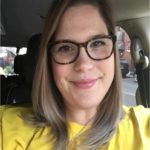 Dr. Emma Wood is a licensed clinical psychologist, public speaker, trainer, consultant and blogger in Waco. You can see more of her work and get more information about the services she provides at www.dremmajwood.com
Dr. Emma Wood is a licensed clinical psychologist, public speaker, trainer, consultant and blogger in Waco. You can see more of her work and get more information about the services she provides at www.dremmajwood.com
The Act Locally Waco blog publishes posts with a connection to these aspirations for Waco. If you are interested in writing for the Act Locally Waco Blog, please email [email protected] for more information.
References:
[1] World Health Organization [WHO]. “Strengthening mental health promotion (Fact Sheet No. 220.),” www.who.int/mediacentre/factsheets/fs220/en (accessed January 6, 2010).
By Meilana Charles
In April, Prairie View A&M University-Cooperative Extension Program’s “Dine on 3,” healthy living social media initiative focused on cooking with kids.
In my previous career as an early childhood professional I enjoyed preparing and cooking in the classroom with students. Taste tests, pumpkin carvings at the sensory table, creating salads from fruits and vegetables picked from the garden, and introducing different types of foods from different cultures were just a few of the activities implemented in my classrooms. And, as a young professional, I didn’t even know the long-term benefits associated with cooking with kids!
As an extension agent in McLennan County, I have found that few parents know the benefits of preparing a meal with their children. For example, in one of my classes I noticed a preschool-aged girl attentively focused, watching her mother prepare a fruit smoothie. When I inquired about her daughter’s fascination, the mother replied that she’d never made a smoothie and her daughter wasn’t allowed to be in the kitchen when the adults were cooking.
Children only get in the way, this is my “alone time,” it’s not safe… many parents seem adamant that children don’t belong in the kitchen. To counter this resistance, I make sure to include information regarding the importance of cooking with children in my health and nutrition programs. I make sure to explain that parents need to introduce their children as early as age 2, to age appropriate activities when preparing meals. Additionally, I explain that aside from the cooking skills, there are nutritional, developmental and academic benefits associated with letting children assist in the kitchen.
In the end I hope that some of the information provided convinces parents to allow their children to take some role in preparing meals for with their children. The long-term benefits far outweigh the reasons to avoid having them help.
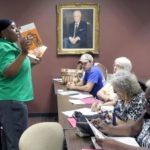 This Act Locally Waco blog post was written by Meilana Charles. Meilana is a Family and Consumer Sciences Extension Agent at Cooperative Extension Program at Prairie View A&M University. Meilana’s priority areas for providing educational resources to McLennan County are general nutrition, money management and parenting. She has a M.S. in Child Development from Texas Woman’s University and is a certified Human Development and Family Studies professional through American Association of Family and Consumer Sciences.
This Act Locally Waco blog post was written by Meilana Charles. Meilana is a Family and Consumer Sciences Extension Agent at Cooperative Extension Program at Prairie View A&M University. Meilana’s priority areas for providing educational resources to McLennan County are general nutrition, money management and parenting. She has a M.S. in Child Development from Texas Woman’s University and is a certified Human Development and Family Studies professional through American Association of Family and Consumer Sciences.
The Act Locally Waco blog publishes posts with a connection to these aspirations for Waco. If you are interested in writing for the Act Locally Waco Blog, please email [email protected] for more information.

